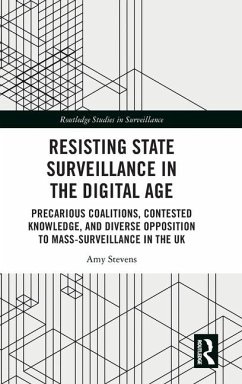
Living with Digital Surveillance in China
Citizens' Narratives on Technology, Privacy, and Governance
Versandkostenfrei!
Versandfertig in 6-10 Tagen
43,99 €
inkl. MwSt.
Weitere Ausgaben:

PAYBACK Punkte
22 °P sammeln!
Digital surveillance is a daily and all-encompassing reality of life in China. This book explores how Chinese citizens make sense of digital surveillance and live with it. It investigates their imaginaries about surveillance and privacy from within the Chinese socio-political system.Based on in-depth qualitative research interviews, detailed diary notes, and extensive documentation, Ariane Ollier-Malaterre attempts to 'de-Westernise' the internet and surveillance literature. She shows how the research participants weave a cohesive system of anguishing narratives on China's moral shortcomings a...
Digital surveillance is a daily and all-encompassing reality of life in China. This book explores how Chinese citizens make sense of digital surveillance and live with it. It investigates their imaginaries about surveillance and privacy from within the Chinese socio-political system.
Based on in-depth qualitative research interviews, detailed diary notes, and extensive documentation, Ariane Ollier-Malaterre attempts to 'de-Westernise' the internet and surveillance literature. She shows how the research participants weave a cohesive system of anguishing narratives on China's moral shortcomings and redeeming narratives on the government and technology as civilising forces. Although many participants cast digital surveillance as indispensable in China, their misgivings, objections, and the mental tactics they employ to dissociate themselves from surveillance convey the mental and emotional weight associated with such surveillance exposure.
The book is intended for academics and students in internet, surveillance, and Chinese studies, and those working on China in disciplines such as sociology, anthropology, social psychology, psychology, communication, computer sciences, contemporary history, and political sciences. The lay public interested in the implications of technology in daily life or in contemporary China will find it accessible as it synthesises the work of sinologists and offers many interview excerpts.
Based on in-depth qualitative research interviews, detailed diary notes, and extensive documentation, Ariane Ollier-Malaterre attempts to 'de-Westernise' the internet and surveillance literature. She shows how the research participants weave a cohesive system of anguishing narratives on China's moral shortcomings and redeeming narratives on the government and technology as civilising forces. Although many participants cast digital surveillance as indispensable in China, their misgivings, objections, and the mental tactics they employ to dissociate themselves from surveillance convey the mental and emotional weight associated with such surveillance exposure.
The book is intended for academics and students in internet, surveillance, and Chinese studies, and those working on China in disciplines such as sociology, anthropology, social psychology, psychology, communication, computer sciences, contemporary history, and political sciences. The lay public interested in the implications of technology in daily life or in contemporary China will find it accessible as it synthesises the work of sinologists and offers many interview excerpts.














